Get approval.
Make sure the person who will be conducting your wedding ceremony will accept personalized vows. Many Catholic and Episcopal officiants require that you still recite part or all the traditional vows to make a valid marriage. This is not something you want to discover at the last minute. After you receive permission to write your own vows, it is a good idea to have your officiant review them before the ceremony to make sure that everything is acceptable.
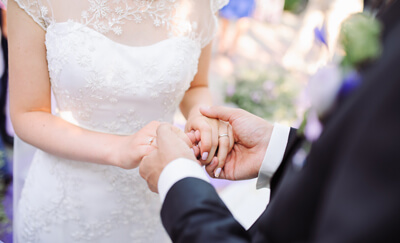
When doing your own vows, be sure to check that its acceptable to make personalized vows prior to the ceremony.
Together or separate?
Now you will need to decide whether you will write your vows together or separately. Writing them together can be a fulfilling, intimate exercise that takes the edge off of coming up with something all by yourself, but it can also be a source of conflict for some couples in those stressful pre-wedding days. You will need to discuss this with your partner and make a decision based on both of your levels of comfort.
Tackling it together.
So you’ve decided to put your hearts and heads together to write your vows. Where do you start? First, discuss together the tone of the vows. Will they be lighthearted? Humorous? Romantic? Serious? Once you’ve found your “voice”, you can begin writing. Traditional promises include love, honor, commitment, and faithfulness but you can add any important marital quality to personalize your commitment to one another. Try equality, acceptance of imperfections, patience, and sacrifice. You can even even be specific -- like promising to put the seat down on the toilet or never going to be angry! Famously, Brad Pitt and Jennifer Anniston promised to “split the difference on the thermostat” in their vows.
Now that you’ve looked at things to give your partner, don’t forget to address things you want to avoid. Are you a control freak? Impatient? A shopaholic? Have a temper? Promise to try to tone down your less engaging qualities and to work on improving or removing them throughout your marriage.
Finally, address any issues that might be particular to your situation. This could include an interracial or interfaith marriage, children from a previous relationship, a job that requires long periods of time apart, or any number of things that might put strain on a marriage.
If you go it alone.
So you are writing separate vows. You want them to be a true representation of your feelings, but you still need them to have some level of continuity. You can do this by creating a few ground rules like: Starting each vow with “I promise to... “ or having an ending to each statement that you can each agree on like “with this I promise.” Or you can start with what you love about each other; what you love about each other as a couple; and then what you vow to each other. As long is there is a general format, there will be enough cohesion to lend a good sense of flow to the ceremony.
Finding your voice.
You want to keep it short, no more than five minutes each. And you want to be authentic. Your vows should reflect your way of speaking. If you don’t normally use words like “ardent” or “joyful” don’t start now. Also, beware of giving out details that are little too intimate for a crowd. You don’t want to cause your guests (or your partner!) any undue embarrassment.
When you are done, read your vows aloud to find any awkward sections or phrases that need rewording. If you are planning on memorizing them, keep a copy of them with you at the ceremony...just in case. But don’t practice too much -- you don’t want to sound rehearsed. Ask a good friend or relative if they will listen to your vows and give you feedback. You might be so caught up in the moment that you overlook some necessary detail that an unbiased observer might find right away.
Say what?
So what should you say? To get started, make a list of five to ten things that you love about your future spouse. Then, list long term commitments and promises you are willing to make for them. You might want to ask your partner which are most important to them. Feel free to use quotations or small snippets of poetry to describe your feelings.
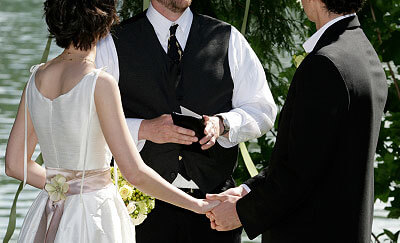
Our wedding vows are some of the most important words we get to say in a life time, take time to preparing them.
Do you have any suggestions for helping couples write their vows?
To share or not to share?
Now that you’ve written your vows, should you share them with each other before the ceremony? On one hand, very different approaches to the writing of them might cause awkwardness on the day of the ceremony, so it might be nice to have time to review and modify them as necessary. On the other hand, many couples feel like this is a gift they give one another on their wedding day and don’t want to spoil the surprise. It is a personal call, to be sure.
Did You Know?
An older tradition for Irish church weddings follows this vow:
As the sun follows its course, mayst thou follow me.
As light to the eye, as bread to the hungry, as joy to the heart,
May thy presence be with me, oh one that I love, 'til death comes to part us asunder."
The Irish Vow of Unity is among the simplest and most beautiful of Irish wedding vows, spoken by the bride and groom:
Heart to heart and hand in hand.
Mark, O Spirit, and hear us now,
Confirming this, our Sacred Vow."






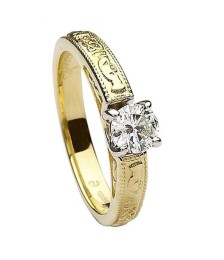 Embossed Claddagh Ring
Embossed Claddagh Ring 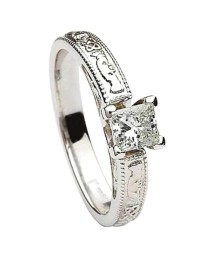 Embossed Princess Ring
Embossed Princess Ring  Embossed Ring Princess Cut
Embossed Ring Princess Cut 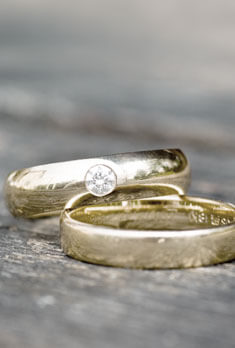

 Ogham Cross Faith Ring
Ogham Cross Faith Ring 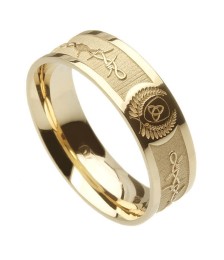 Barbed Wire Ring
Barbed Wire Ring  Ogham Le Chéile Ring
Ogham Le Chéile Ring